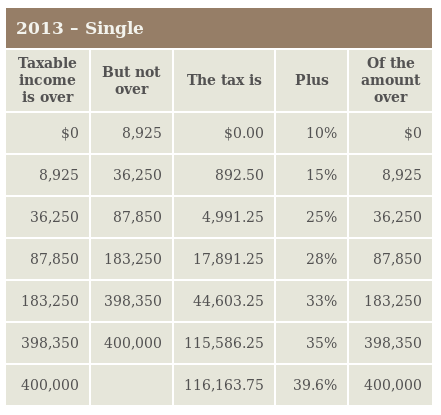General question here about US personal income federal tax rates. Is it a cumulative effect where your income is first taxed at the lower tranches and move up, or is it one specific percent for your entire taxable income?
2 Answers
The US federal income tax is a marginal tax rate system, so your total tax is calculated cumulatively in that you're taxed at different rates for each part of your income that falls in a different tax bracket. Fairmark has a nice table that sums this up for individuals filing taxes on their own:

For example, if you make $65,000/year, you're taxed at 10% on the first $8,925, 15% on everything over $8,925 but under $36,250, and 25% on the remainder of your salary because you don't make over $87,850, which would put you into the next bracket.
Of course, the US tax system is much more complicated than this, because there are state taxes, Social Security/Medicare taxes, pre-tax deductions, capital gains taxes, etc. In the simplest case, however, this is the basis for how federal income taxes work.
The IRS also publishes a detailed table that describes marginal tax rates.
-
-
2Thanks for the detailed explanations. Why does the $398,350 to $400,000 bracket seem meaningless? It looks like most people are effectively taxed 33% from $183,250 to $400,000. I've seen similar charts with changing married tax rates so I'm assuming that bracket is mostly for them.– MoiCommented Jul 31, 2013 at 7:25
-
2@Moi I don't know for sure, but it may be because the 35% tax bracket is left over from earlier tax brackets. If you look at the 2012 tax schedule, 35% is the highest. The 39.6% bracket was added for 2013, so maybe there were reasons for putting starting the new highest bracket at $400K, thus making the 35% tiny. That's just conjecture on my part, though. Commented Jul 31, 2013 at 12:58
Is it a cumulative effect where your income is first taxed at the lower tranches and move up, or is it one specific percent for your entire taxable income?
Cumulative effect.
This is called "marginal tax rate". Basically each dollar is taxed at a certain rate up to a certain amount, and then the dollars above that amount are taxed at the next rate up to a certain amount, and so on. So every new dollar earned is taxed at the "latest" rate until you exceed that rate's limit, and then the next dollar and on will go to the next rate.
These limits are called "brackets", and in the US the tax rates are growing from one bracket to the next. It doesn't necessarily have to be like that, but that's how it is in the US. This is called "progressive" taxation, because the more you earn the higher your marginal tax rate is (because the rates grow from bracket to bracket).
A case where the rates don't grow from bracket to bracket, but go down - is called "regressive" tax rate, because the more you earn the lower your marginal tax rate would be. An example of such tax in the US is the Social Security tax (part of FICA). But I don't know of any country actually implementing that for regular income tax1.
A milder version of regressive taxation is a flat tax (i.e.: all income taxed at the same rate), which is also considered regressive because the lower-income individuals end up paying more taxes than higher income individuals, when compared to their living expenses. In the US, Federal Medicare tax (the other part of FICA) is a flat tax. Some of the States charge flat income taxes. VAT and Sales taxes are also examples of a flat tax.
The dollar amounts for tax brackets are updated yearly by the IRS. For 2013 amounts see this document, table 1.
1Actually I do know. The US Federal corporate income tax brackets do not follow the monotonic upward trend. As you can see from the link, the bracket of $100K-$335K is taxed at 39%, but the next bracket of $335K-$10M is taxed at a lower rate of 34%. The upward trend resumes from there on.
-
1I'd argue that it is debatable whether SS tax is regressive considering that benefits are also capped commensurate with the caps on income levels where the tax is collected.– JohnFx ♦Commented Aug 5, 2013 at 3:40
-
it doesn't make the tax less regressive. Moreover, SS is only charged on earned income, whereas for many richer individuals they may not have any - all will come from capital gains/dividends/passive income. Commented Aug 5, 2013 at 3:45
-
2I suppose it all boils down to whether you look at SS as an entitlement program or a Government mandated retirement insurance program. However, Don't want this to turn into a political thread so I'll leave it at that and not offer an opinion either way.– JohnFx ♦Commented Aug 5, 2013 at 4:12
